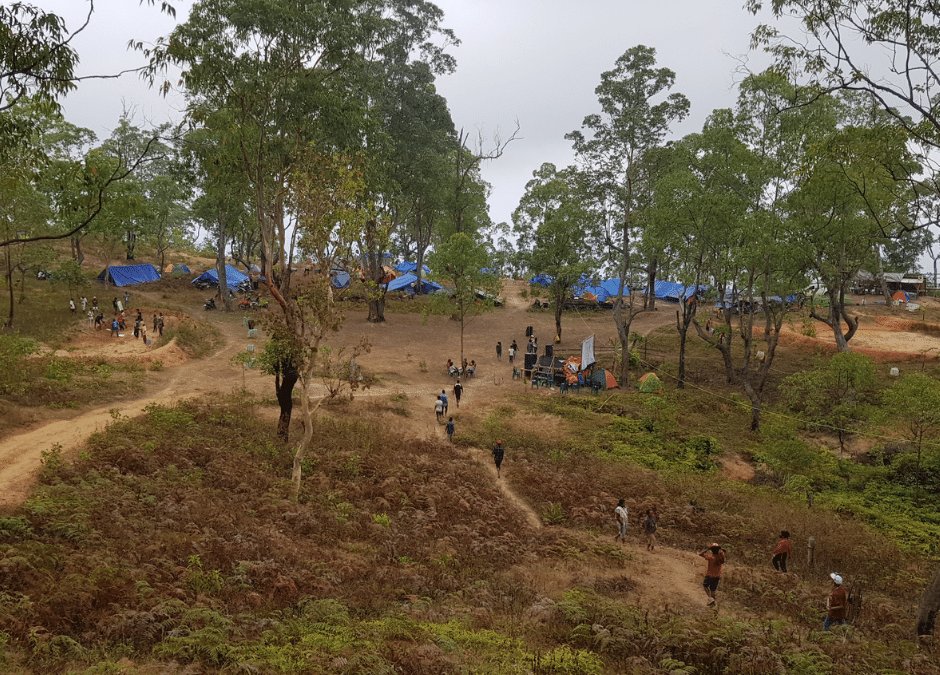Protecting spring water is critical to ensure the safe – and sustainable – supply of water in many rural communities of Timor-Leste. Timor-Leste is a beautiful but mountainous country, terrain which makes accessing water through borehole wells impractical. As a result, a significant number of rural households rely on gravity-fed and community-managed water systems which pipe water from nearby springs to community tap stands. These are a great solution for the terrain but it’s challenging to maintain water quality and, critically, quantity. The wet season sees intense rain which can overwhelm and contaminate the system, while the dry season is long enough that water needs to be rationed carefully in many communities to ensure the springs don’t dry up.
A recent study conducted by Plan International Timor-Leste looked at the supply of water across 146 communities. The study identified that a number of perennial challenges, such as the contamination of water supply, persist. It also highlighted how climate change, which is projected to increase flooding and droughts, is likely to exacerbate existing issues of water scarcity in the dry season. If this water infrastructure is already a challenge in many communities, how will these communities cope with additional challenges? A collaborative research project is currently underway which seeks to explore this question, and assesses how recent successful initiatives could be implemented in other communities.
Featured image: In October 2020, a Permayouth training camp creates hands-on learning for water catchment management for 200 men and 100 women who came from municipalities across Timor-Leste
Timor-Leste’s water problem
The provision of water – in quality and quantity – remains a core challenge in Timor-Leste.
Timor-Leste’s Strategic Development Plan for 2030 aims for all citizens to have access to clean water and improved sanitation. If this is to be achieved, current efforts need to be accelerated, deepened, and scaled, with a particular focus on rural areas, where some 70% of Timor-Leste’s 1.3 million residents call home.
The World Bank has stated that greater attention to the maintenance of rural water supply schemes can support the achievement of these targets. The main barriers to progress have been the lack of technical support, the capacity of institutions, and funding. These factors have resulted in low levels of water management, degradation of water supplies and systems, and a high vulnerability to climate change. Many areas of Timor-Leste are continuously managing the seasonal tensions and climate change impacts of either having too much water, or not having enough.
Through EWB’s work in the Water Sanitation and Hygiene (WASH) sector, we know that community-led solutions are key to the success of water management. This research project focuses on the challenge of surface water management in Timor-Leste, in particular how the supply of water from springs is managed.
A collaborative research effort
Whilst a number of factors for effective community management of spring water sources have been identified, little research has delved into the success factors for effective catchment management, or the role communities and local government are playing (and can play).
EWB Australia has facilitated a team to collaborate on this research. Our partners are – Plan International Timor-Leste who have extensive WASH experience and existing baseline data that will be critical in feeding into this project; Permatil, a local Timorese non-government organisation (NGO) with expertise in community-led catchment management solutions for spring source rehabilitation; and RMIT university in Melbourne who are providing important research design support, analysis and authoring with Dr Tanja Rosenquist and Dr Nick Brown, founders of the Humanitarian Engineering Lab. EWB Australia’s team in Timor-Leste is supporting the work through technical assessments and community engagement.
Research underway
This research will build on the recent study by Plan International to map the social, ecological and technical challenges faced by communities, how they manage these and where additional support might be needed.
Community-led solutions are key to the success of water management, and Permatil has been at the forefront of this, using simple community-led interventions to manage water catchments. This research aims to highlight the successes of these implementations and learn more about their impact in rural communities that struggle with water access. The role of communities vis-a-vis local governments and NGOs in catchment management is also a part of the research remit.
Publishing the outcomes
Once completed, this research will feed into a book in development, focused on spring water protection, and will form part of a chapter that considers the challenges of safely managing spring water in remote settings. The research will also be shared in forums such as the upcoming Research for Development Impact Conference and with stakeholders and participants in Timor-Leste.
Importantly, this work will generate additional insights for the development community, and engineering sectors (as well as inform EWB’s own work in Timor-Leste and other countries), and opens the path for future research collaborations and funding opportunities.
EWB Australia’s work in Timor-Leste receives support from the Australian Government through the Australian NGO Cooperation Program (ANCP). You can also donate to support our work in Timor-Leste.
UPDATE: The recent flooding in Timor-Leste’s capital, Dili, is thought to have destroyed about 30% of the gravity-flow schemes servicing the city leaving many without access to safe water. Further visible contamination has been seen in a number of surrounding communities. The team in Timor-Leste is working hard with the government and communities to secure access to safe water through water filtration and temporary water kiosks. The recent events highlight the profound importance of this work in an era of climate change when equitable and sustainable access to safe water is becoming more challenging than ever, and yet as critical as it has always been.


